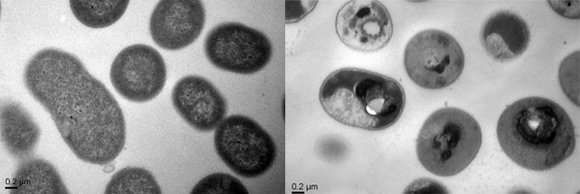
Across the globe, bacteria are becoming increasingly resistant to antibiotics leading to the rise of dangerous superbugs, which currently kill around 700,000 people worldwide every year.
This number is expected to rise to a staggering 10 million people annually by the middle of this century. With that reality looming, the search for new treatments is urgent.
"There is an urgent global need for new antimicrobials that are effective against superbugs," Jackie Y. Ying, from Singapore Agency for Science, Technology and Research (A*STAR), said in a statement announcing a possible breakthrough. "The situation has become more acute because bacteria are starting to develop resistance to the last-line antibiotics, which are given only to patients infected with bacteria resistant to available antibiotics."
Potential alternatives to antibiotics include synthetic polymers, large molecules composed of many repeated subunits. But the compounds developed so far have been too toxic for use in humans, not biodegradable or capable of destroying only one type of bacteria.
Ying and an international team of scientists may have overcome these challenges. In a new paper in Nature Communications, they report their creation of a synthetic molecule that can kill five different types of deadly multi-drug resistant bacteria. The molecule, the authors note, could be incorporated into new drugs to treat patients with antibiotic-resistant infections.
The new molecule is part of a class of antimicrobial polymers called guanidinium-functionalized polycarbonates. The compound stands apart from other efforts because it not only targets and kill several drug-resistant bacteria, but also is safe for humans as well as biodegradable.
The tested the new polymer in mice infected with five difficult-to-treat and potentially deadly bacteria that are commonly found in hospitals: Acinetobacterbaumannii, Escherichia coli, Klebsiella pneumoniae, methicillin-resistant Staphylococcus aureus (commonly known as MRSA) and Pseudomonas aeruginosa. Following treatment with the new polymer, the mice showed no signs of infection or toxic side effects, the first time such results have been demonstrated.
"Once the polymer finishes its job of killing the bacteria, it will be naturally degraded after three days and will not remain in the body," said Yi Yan Yang, Group Leader at the Institute of Bioengineering and Nanotechnology, in Singapore. "This antimicrobial agent shows great promise for the treatment and prevention of multidrug-resistant systemic infections."
Even after multiple treatments, bacteria did not show any signs that they were becoming resistant to the polymer. The researchers say that the new molecule could lead to an entirely new class of treatments for multiple diseases.
Uncommon Knowledge
Newsweek is committed to challenging conventional wisdom and finding connections in the search for common ground.
Newsweek is committed to challenging conventional wisdom and finding connections in the search for common ground.
About the writer
Aristos is a Newsweek science reporter with the London, U.K., bureau. He reports on science and health topics, including; animal, ... Read more
To read how Newsweek uses AI as a newsroom tool, Click here.








